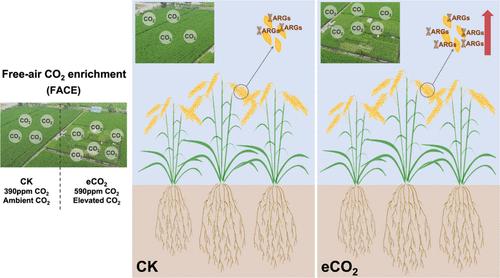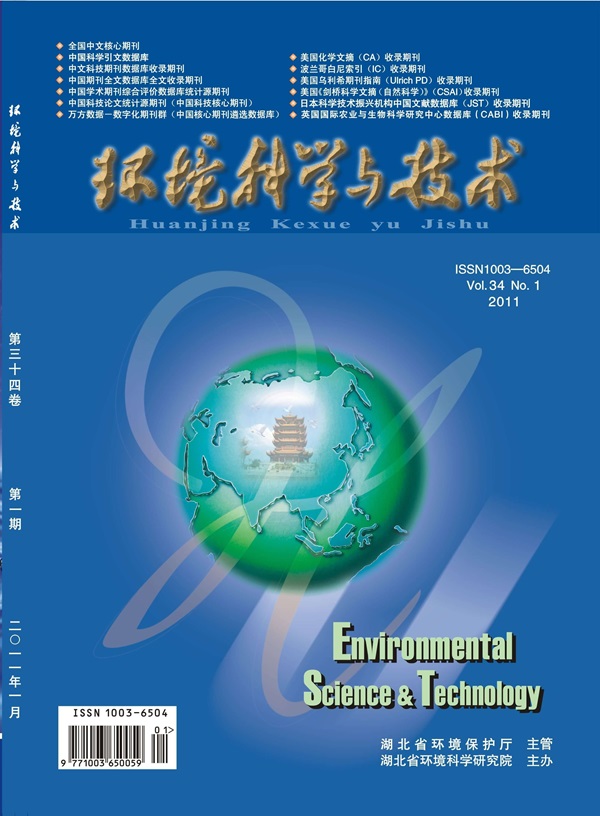Elevated CO2 Increased Antibiotic Resistomes in Seed Endophytes: Evidence from a Free-Air CO2 Enrichment (FACE) Experiment
IF 11.3
1区 环境科学与生态学
Q1 ENGINEERING, ENVIRONMENTAL
引用次数: 0
Abstract
Climate warming affects antibiotic resistance genes (ARGs) in soil and the plant microbiome, including seed endophytes. Seeds act as vectors for ARG dissemination in the soil–plant system, but the impact of elevated CO2 on seed resistomes remains poorly understood. Here, a free-air CO2 enrichment system was used to examine the impact of elevated CO2 on seed-associated ARGs and seed endophytic bacteria and fungi. Results indicated that elevated CO2 levels significantly increased the relative abundance of seed ARGs and mobile genetic elements (MGEs), especially those related to beta-lactam resistance and MGEs. Increased CO2 levels also influenced the composition of seed bacterial and fungal communities and the complexity of bacteria–fungi interactions. Fungi were more sensitive to changes in the CO2 level than bacteria, with deterministic processes playing a greater role in fungal community assembly. Co-occurrence network analysis revealed a stronger correlation between fungi and ARGs compared to bacteria. The structure equation model (SEM) showed that elevated CO2 directly influenced seed resistomes by altering bacterial composition and indirectly through bacteria–fungi interactions. Together, our work offers new insights into the effects of elevated CO2 on antibiotic resistomes in the seed endosphere, highlighting their increased dissemination potential within soil–plant systems and the associated health risks in a changing environment.

升高的CO2增加了种子内生菌的抗生素抗性:来自自由空气CO2富集(FACE)实验的证据
气候变暖会影响土壤和植物微生物组(包括种子内生菌)中的抗生素抗性基因(ARGs)。种子是 ARG 在土壤-植物系统中传播的载体,但人们对二氧化碳升高对种子抗性基因组的影响仍然知之甚少。本文利用自由空气二氧化碳富集系统研究了高浓度二氧化碳对种子相关抗逆基因以及种子内生细菌和真菌的影响。结果表明,二氧化碳浓度的升高显著增加了种子ARGs和移动遗传因子(MGEs)的相对丰度,尤其是那些与β-内酰胺抗性和MGEs相关的遗传因子。二氧化碳水平的升高还影响了种子细菌和真菌群落的组成以及细菌与真菌相互作用的复杂性。与细菌相比,真菌对二氧化碳水平的变化更为敏感,决定性过程在真菌群落的组成中发挥了更大的作用。共现网络分析显示,与细菌相比,真菌与ARGs之间的相关性更强。结构方程模型(SEM)显示,升高的二氧化碳通过改变细菌组成直接影响种子抗逆群落,并通过细菌与真菌的相互作用间接影响种子抗逆群落。总之,我们的工作为了解高浓度二氧化碳对种子内圈抗生素抗性基因组的影响提供了新的视角,凸显了它们在土壤-植物系统中传播潜力的增加,以及在不断变化的环境中与之相关的健康风险。
本文章由计算机程序翻译,如有差异,请以英文原文为准。
求助全文
约1分钟内获得全文
求助全文
来源期刊

环境科学与技术
环境科学-工程:环境
CiteScore
17.50
自引率
9.60%
发文量
12359
审稿时长
2.8 months
期刊介绍:
Environmental Science & Technology (ES&T) is a co-sponsored academic and technical magazine by the Hubei Provincial Environmental Protection Bureau and the Hubei Provincial Academy of Environmental Sciences.
Environmental Science & Technology (ES&T) holds the status of Chinese core journals, scientific papers source journals of China, Chinese Science Citation Database source journals, and Chinese Academic Journal Comprehensive Evaluation Database source journals. This publication focuses on the academic field of environmental protection, featuring articles related to environmental protection and technical advancements.
 求助内容:
求助内容: 应助结果提醒方式:
应助结果提醒方式:


